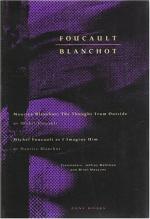|
This section contains 1,116 words (approx. 4 pages at 300 words per page) |

|
SOURCE: “Precise, Lucid, and Quiet,” in Times Literary Supplement, October 27, 1995, p. 26.
In the following review, Josipovici praises Blanchot's early works of literary criticism but finds shortcomings in the cryptic assertions of The Work of Fire and The Writing of Disaster.
When, in the early 1970s, I was trying to persuade British publishers to bring out a selection of the essays of Maurice Blanchot, no one was interested. Now at last the bulk of his work is becoming available in English, thanks largely to the Anglo-American academic interest in his friends and contemporaries Michel Foucault, Jacques Derrida, Edmond Jabès and Emmanuel Levinas. But this has led to a curious bias in our perception of Blanchot, since what has caught the attention has been that part of his work which was either specifically written in dialogue with these writers, or which seems closely related to their concerns. That bias...
|
This section contains 1,116 words (approx. 4 pages at 300 words per page) |

|


